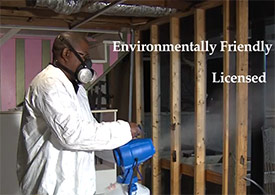Can Mold Exposure Cause Lung Cancer?

Can Mold Exposure Cause Lung Cancer?
Mold exposure is linked to a wide range of respiratory ailments, but can it cause lung cancer? Our Manhattan mold removal experts share information from the medical community about health risks associated with mold infestations.
Mold and Lung Cancer
Fortunately, there’s no evidence to show a direct cause-and-effect relationship between mold and lung cancer. Extended mold exposure can result in pulmonary fibrosis (PF), a disease in which lung tissue becomes thick with scars and leads to shortness of breath.
Long-term PF can increase the possibility of developing lung cancer. In most cases the cause of PF is undetermined, and mold is not one of the leading factors.
Health Risks of Mold
Allergic symptoms are the most common danger from mold exposure. Depending on their level of sensitivity, people can experience upper respiratory problems ranging from itchy, watery eyes to coughing and sneezing.
More seriously, mold can trigger attacks in asthma sufferers or cause chronic sinusitis. People with existing lung conditions or compromised immune systems may develop pneumonia or a fungal-based infection known as aspergillosis.
How Does Mold Cause Illness?
Mold illnesses arise when airborne spores enter the body, causing various levels of irritation and inflammation. Stachybotrys and Aspergillus are two species of toxin-producing molds that provide more reason for concern.
While not all mold is dangerous, don’t take chances. The Centers for Disease Control and Prevention (CDC) recommend that any signs of infestation should be removed.
Stern Mold: The #1 Choice for Manhattan Mold Removal
Pamela Stern, a trained and experienced member of the National Organization of Remediators and Mold Inspectors (NORMI), leads our team of Manhattan mold removal technicians. Contact us for more information.




